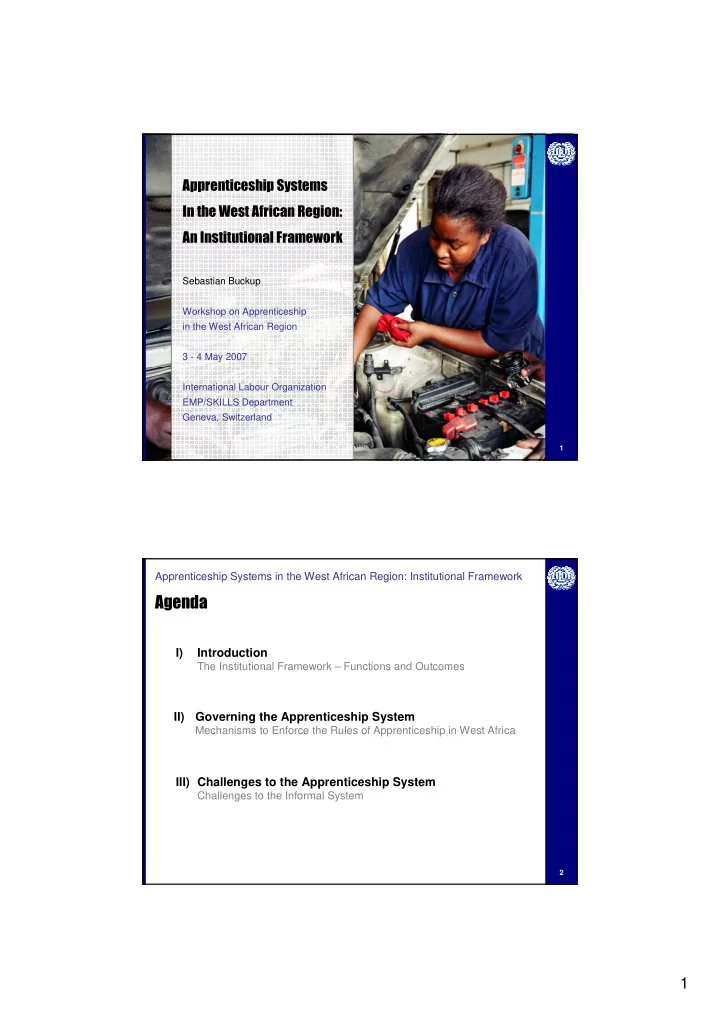

����������������������� ���������������������������� �������������������������� Sebastian Buckup Workshop on Apprenticeship in the West African Region 3 - 4 May 2007 International Labour Organization EMP/SKILLS Department Geneva, Switzerland 1 Apprenticeship Systems in the West African Region: Institutional Framework ������ I) Introduction The Institutional Framework – Functions and Outcomes II) Governing the Apprenticeship System Mechanisms to Enforce the Rules of Apprenticeship in West Africa III) Challenges to the Apprenticeship System Challenges to the Informal System 2 1
� ������������ The Institutional Framework – Functions and Outcomes 3 I) Introduction ��������������������������������������������������� Institutional Framework (rules + enforcement) Functional Development outcome outcome - Relevance / quality of skills? Provide incentives for master - Equity of Access? craftsperson and apprentice to - Employability of apprentices? participate in apprenticeship - Productivity and compe- titiveness of enterprises? 4 2
I) Introduction ������������������������������������������������ Apprenticeship in the informal economies of the West African Region is embedded in an informal institutional framework: Informal institutions are behavioral regularities based on socially-shared rules that are created communicated and enforced outside the officially-sanctioned channels Institutional informal formal Framework enforced by… enforced by… - social networks - Governments - Informal associations - Trade unions - clans - Employers organizations 5 �� ����������������������� ������ Mechanisms to Enforce the Rules of Apprenticeship in West Africa 6 3
II) Governing the Apprenticeship System ������������������������������� ��������������!����� training & allowances allowances Apprentice Apprentice Master Trainer Master Trainer unskilled labor skilled labor investment period recovery period Master only invests in training if apprentice makes a credible commitment to stay in the recovery period 7 II) Governing the Apprenticeship System "������������������#�������������$ - The apprentice is able to credibly commit if breaking the agreement is more costly than cooperating. - Sanctioning or Enforcement mechanisms increase the costs of breaking the agreement - Requirements for effective sanctioning are: - Monitoring mechanism - Threat of sanctioning is credible - Impact of the punishment is sufficiently high - Social networks important to create these conditions 8 4
II) Governing the Apprenticeship System %�����������������������������&������� Apprenticeship often carried out in social networks Recruitment among friends and family: - ILO/IUED Study (1980) Bamako: 71.1% ,Yaoundé: 64.1% - ILO Study (1991) Lomé: 24% directly related, 47% previously acquainted - Ghana RPED Study(1992) 85% through friends and relatives 9 II) Governing the Apprenticeship System %������������������������������'�( - Affection / Emotional Ties apprenticeship in social networks avoids opportunistic behaviour SNs : - Shaping individual learning process Moral Rules / Religious Beliefs - apprenticeship in social networks changes preferences SNs : - Channeling common knowledge 10 5
II) Governing the Apprenticeship System %������������������������������'��( Reciprocity - repeated social/economic interaction creates opportunities for retaliation SNs : - creating interdependence Reputation - present behaviour shapes expectations of actors on future behaviour SNs : - disseminating (credible) information Communal Sanctions - members of the community punish deviators SNs : - overcoming collective action problems 11 II) Governing the Apprenticeship System �������&����������������)����������*��#�����$ Social networks may improve outcomes by… - disseminating credible information - creating interdependence - shaping learning processes - solving collective action problems … they also may corrupt outcomes by… - creating a mechanism of exclusion - impeding competition 12 6
III) Governing the Apprenticeship System %�����������#��������������������� Hostages / Trade Secrets - hiding a crucial skill from the apprentice creates incentive to obey Basis: - private arrangement Payment Structure of Apprenticeship Fees - delaying the payment of fees creates incentive for master to train Basis: - private arrangement Market Failure - lack of capital requires apprentice to stay with master to amass savings for self employment Basis: - economic structure 13 III) Governing the Apprenticeship System )��������� - Social networks empirically relevant for the recruitment of master / apprentice - Social networks contribute to the functional outcomes of apprenticeship institutions by providing effective enforcement mechanisms - Yet, there are also important weaknesses of social networks (e.g. quality, exclusion) - Enforcement mechanisms beyond social networks gain importance and deserve further studying 14 7
��� �������� Challenges to the System and Possible Responses 15 III) Challenges to the Apprenticeship System )���������������������������������������'�( Do the benefits still justify the costs of the training? Technological change - how will apprenticeship systems deal with complex knowledge? Emergence of new professions - is the traditional training system able to embrace new professions? Globalization - does training for occupational competence fit the needs of new production organizations and value chains? 16 8
III) Challenges to the Apprenticeship System )���������������������������������������'�( … and what about the enforcement mechanisms? Urbanization and Population growth - how does this change the effectiveness of social networks? Health Threats - how do pandemics affect incentives to train? State Neglect - how does the lack of strategic support affect the system? 17 �������������������� ���������+ 18 9
Recommend
More recommend